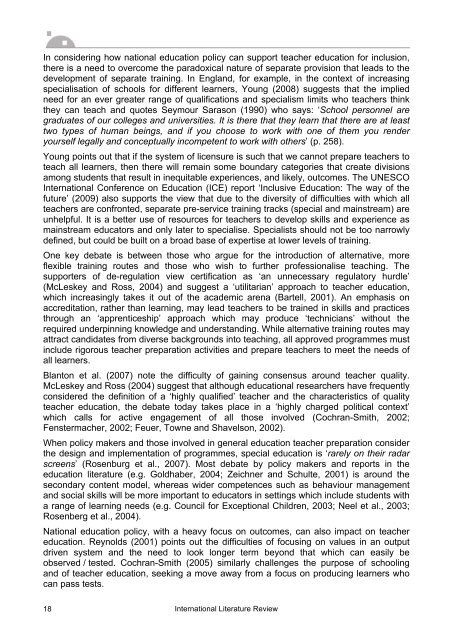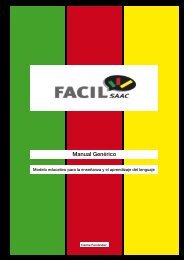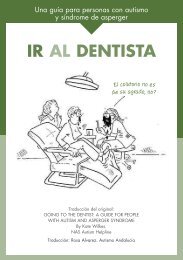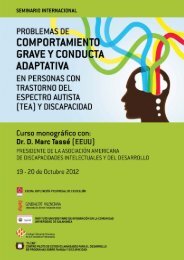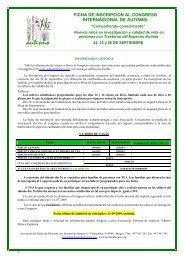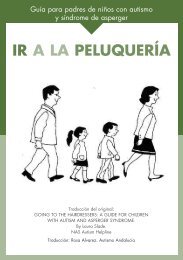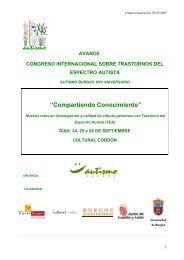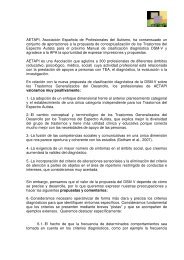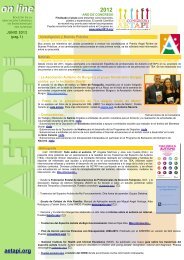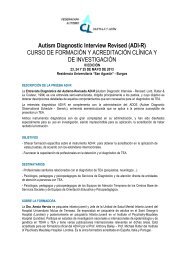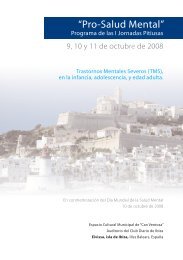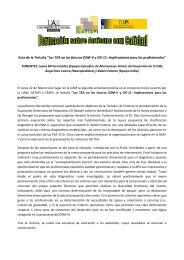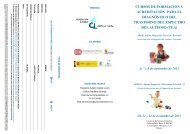TEACHER EDUCATION FOR INCLUSION - Aetapi
TEACHER EDUCATION FOR INCLUSION - Aetapi
TEACHER EDUCATION FOR INCLUSION - Aetapi
Create successful ePaper yourself
Turn your PDF publications into a flip-book with our unique Google optimized e-Paper software.
In considering how national education policy can support teacher education for inclusion,<br />
there is a need to overcome the paradoxical nature of separate provision that leads to the<br />
development of separate training. In England, for example, in the context of increasing<br />
specialisation of schools for different learners, Young (2008) suggests that the implied<br />
need for an ever greater range of qualifications and specialism limits who teachers think<br />
they can teach and quotes Seymour Sarason (1990) who says: ‘School personnel are<br />
graduates of our colleges and universities. It is there that they learn that there are at least<br />
two types of human beings, and if you choose to work with one of them you render<br />
yourself legally and conceptually incompetent to work with others’ (p. 258).<br />
Young points out that if the system of licensure is such that we cannot prepare teachers to<br />
teach all learners, then there will remain some boundary categories that create divisions<br />
among students that result in inequitable experiences, and likely, outcomes. The UNESCO<br />
International Conference on Education (ICE) report ‘Inclusive Education: The way of the<br />
future’ (2009) also supports the view that due to the diversity of difficulties with which all<br />
teachers are confronted, separate pre-service training tracks (special and mainstream) are<br />
unhelpful. It is a better use of resources for teachers to develop skills and experience as<br />
mainstream educators and only later to specialise. Specialists should not be too narrowly<br />
defined, but could be built on a broad base of expertise at lower levels of training.<br />
One key debate is between those who argue for the introduction of alternative, more<br />
flexible training routes and those who wish to further professionalise teaching. The<br />
supporters of de-regulation view certification as ‘an unnecessary regulatory hurdle’<br />
(McLeskey and Ross, 2004) and suggest a ‘utilitarian’ approach to teacher education,<br />
which increasingly takes it out of the academic arena (Bartell, 2001). An emphasis on<br />
accreditation, rather than learning, may lead teachers to be trained in skills and practices<br />
through an ‘apprenticeship’ approach which may produce ‘technicians’ without the<br />
required underpinning knowledge and understanding. While alternative training routes may<br />
attract candidates from diverse backgrounds into teaching, all approved programmes must<br />
include rigorous teacher preparation activities and prepare teachers to meet the needs of<br />
all learners.<br />
Blanton et al. (2007) note the difficulty of gaining consensus around teacher quality.<br />
McLeskey and Ross (2004) suggest that although educational researchers have frequently<br />
considered the definition of a ‘highly qualified’ teacher and the characteristics of quality<br />
teacher education, the debate today takes place in a ‘highly charged political context’<br />
which calls for active engagement of all those involved (Cochran-Smith, 2002;<br />
Fenstermacher, 2002; Feuer, Towne and Shavelson, 2002).<br />
When policy makers and those involved in general education teacher preparation consider<br />
the design and implementation of programmes, special education is ‘rarely on their radar<br />
screens’ (Rosenburg et al., 2007). Most debate by policy makers and reports in the<br />
education literature (e.g. Goldhaber, 2004; Zeichner and Schulte, 2001) is around the<br />
secondary content model, whereas wider competences such as behaviour management<br />
and social skills will be more important to educators in settings which include students with<br />
a range of learning needs (e.g. Council for Exceptional Children, 2003; Neel et al., 2003;<br />
Rosenberg et al., 2004).<br />
National education policy, with a heavy focus on outcomes, can also impact on teacher<br />
education. Reynolds (2001) points out the difficulties of focusing on values in an output<br />
driven system and the need to look longer term beyond that which can easily be<br />
observed / tested. Cochran-Smith (2005) similarly challenges the purpose of schooling<br />
and of teacher education, seeking a move away from a focus on producing learners who<br />
can pass tests.<br />
18<br />
International Literature Review


